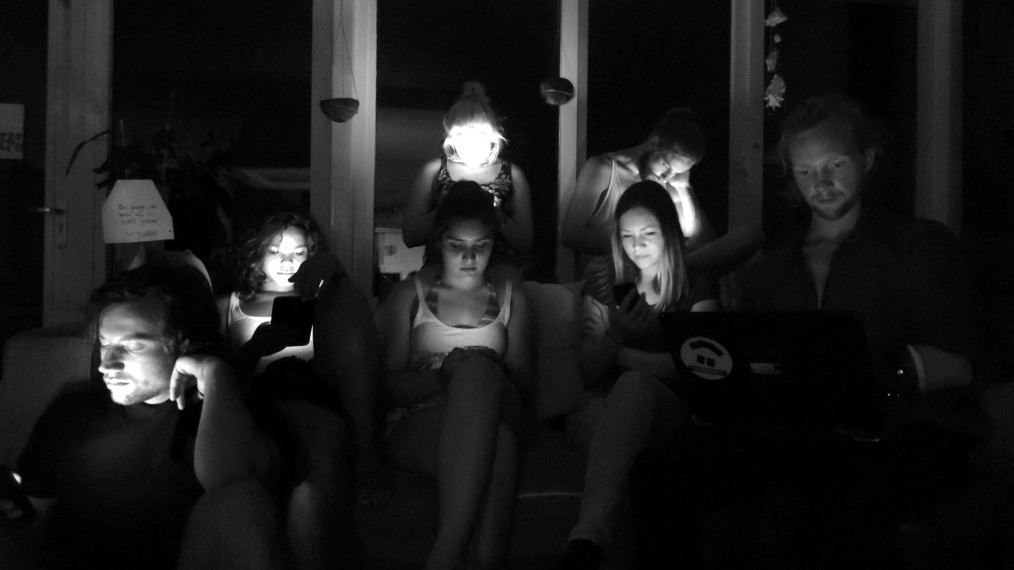
The Psychological Impacts of Extensive Smartphone Use
Second-year Psychology students participating in the University Honours College follow a mini-course on Blogging Science (within the Thematic Meetings course), in which they learn to communicate science to the general public, by means of informing, giving an opinion, and relating issues in science to issues in society. This year a selection of these written blog posts is published on Mindwise. This post is by Lenka Wichmann.
Last week a friend of mine told me ‘I cannot concentrate at home because there are so many distractions, so I always go to the library to study’. If you ask students nowadays where they get most of their study-related work done, a lot of people will probably give you a very similar answer. However, many of the people sitting in the library are spending a lot of time on their smartphones rather than being focused on their study material.
“How come the smartphone now has such an important place in our lives?”
We live in a time that is characterized by rapid developments in the digital world and most electronic devices provide us with many more possibilities than a few decades ago. Just think of the fact that you can easily keep in touch with people all over the world instead of writing letters or walking to the next telephone box to contact people as in the past. But, do we really know how electronic devices are influencing us? Science is beginning to assess the consequences that extensive media use might have, such as its impacts on biorhythms, sleep patterns and possibly cancer risk. Psychological research in particular has just begun to assess the impacts of media use. Some of this research has big potential to teach us how to live with the new media so that it improves our lives without affecting them negatively.
One study examined the relationship between cell phone use and academic performance, which was found to be negatively correlated (Lepp, Barkley, & Karpinski, 2014). A possible explanation is that time spent on the phone is missing in academic endeavors. Another explanation suggests multitasking to be the major issue regarding extensive cell phone use (Rosen, Carrier, & Cheever, 2013) In general, multitasking robs working memory’s capacity and when responding to emotionally gratifying distractors a task is approached in a more superficial way and takes us longer (Carr, 2010). Such effects were shown in a study that assessed students’ distractibility by electronic devices during a 15-minute study period (Rosen et al., 2013). Results were striking in that most participants did not keep on task more than 5-6 minutes at a time. The most distracted students showed lower academic performance and students who assessed Facebook one or two times in that time span had a lower grade point average than those not doing so.
“Clearly, more media in the workplace and shorter attention spans go hand in hand.”
Studies like these show us how we could possibly improve study focus and decrease distractibility. Teachers, for example, are trying to increase students’ attention by completely banning smartphones from their classrooms, and hence taking away the external source of distraction. However, this ‘out of sight out of mind’ approach is not always applicable, since internal distractors still remain. Some researchers, therefore, suggest implementing so called ‘technology breaks’ to motivate students to delay their craving for phone checking behaviors to certain periods in which access is allowed. In this way, internal as well as external distractions might be overcome. Since it was also shown that students who had specific study strategies were also those who were least distracted, students should, above all, be encouraged to gain metacognitive skills to deliberately control urges for emotional gratification and regulate their cell phone use (Rosen et al., 2013). Indeed, it might well be helpful to develop relevant teaching strategies for metacognition, as evidence is growing that extensive media use (especially Facebook) is not only impacting attention spans and academic performance but also associated with different kinds of psychopathology (Rosen, Whaling, Rab, Carrier, & Cheever, 2013).
For example, unexpectedly taking away or limiting accessibility of their smartphones was found to make people feel anxious (Cheever, Rosen, Carrier, & Chavez, 2014). After only 10 minutes, moderate and high users showed increased anxiety although they knew they would get their device back after a short time. This anxiety could be seen as ‘separation anxiety’ caused by a feeling of loss and a need for reliance on their phones – a phenomenon normally occurring in close human relationships (Cheever et al., 2014). In a study by Lepp and colleagues (2014), participants reported feeling obliged to stay connected and that this was a burden for them when asked about their cell phone use in general. Being disconnected and fearing missing out on something, however, led to stress and could be seen as another explanation for this anxiety. This made me think: is dealing with this anxiety by using a smartphone causing exactly what people want to prevent when using the phone – namely, disconnection and isolation (as described by Professor S. Turkle of the Massachusetts Institute of Technology in her book ‘Alone Together’)? How could we then make this paradox more salient to people?
“The anxiety previously described was proposed to be included into the Diagnostic and Statistical Manual of Mental Disorders (the standard tool in psychology and psychiatry for categorizing mental disorders) under the name nomophobia and specified as always carrying around a charger, being stressed by a low battery sign, having the phone switched on 24h, checking the phone constantly, or experiencing a phenomenon called ‘phantom vibration’ as symptoms (Bragazzi, & Del Puente, 2014).”
In my opinion, these criteria seem rather blurry and would actually describe many young people belonging to the ‘i-generation’ quite well. Thus, it is really important to find a middle ground between underestimating effects and psychological impacts of media use and over-pathologizing quite normal and (in our times) adaptive behavior.
What I definitely think is that in this time of constant connectedness in which phones are often the first thing people look at after waking up, are carried everywhere during the day (even to the bathroom), and are the last thing to be checked shortly before falling asleep, we should rethink the role of the new media in our lives.
“Because, although we might be amused in the short term by this new tweet and that new message that are making our time in the library more enjoyable, in the long run we should definitely watch out for its effects on the most important areas of our lives – health, success and well-being.”
References
Bragazzi, N. L., & Del Puente, G. (2014). A proposal for including nomophobia in the new DSM-V. Psychology Research and Behavior Managment, 7, 155-160.
Carr, N. (2011). The shallows: What the internet is doing to our brains. New York, NY, US: W.W. Norton & Co.
Cheever, N. A., Rosen, L. D., Carrier, L. M, & Chavez, A. (2014). Out of sight is not out of mind: The impact of restricting wireless mobile device use on anxiety levels among low, moderate and high users. Computers in Human Behavior, 37, 290-297.
Lepp, A., Barkley, J. E., & Karpinski, A. C. (2014). The relationship between cell phone use, academic performance, anxiety, and satisfaction with life in college students. Computers in Human Behavior, 31, 343-350.
Rosen, L. D., Carrier, L. M., & Cheever, N. A. (2013). Facebook and texting made me do it: Media-induced task switching. Computers in Human Behavior, 29, 948-958.
Rosen, L. D., Whaling, K., Rab, S., Carrier, L. M., & Cheever, N. A. (2013). Is Facebook creating iDisorders? The link between clinical symptoms of psychiatric disorders and technology use, attitudes and anxiety. Computers in Human Behavior, 29, 1243-1254.
Turkle, S. (2011). Alone together: Why expect more from technology and less from each other. New York, NY, US: Basic Books.
NOTE: Image by Lenka Wichmann.



